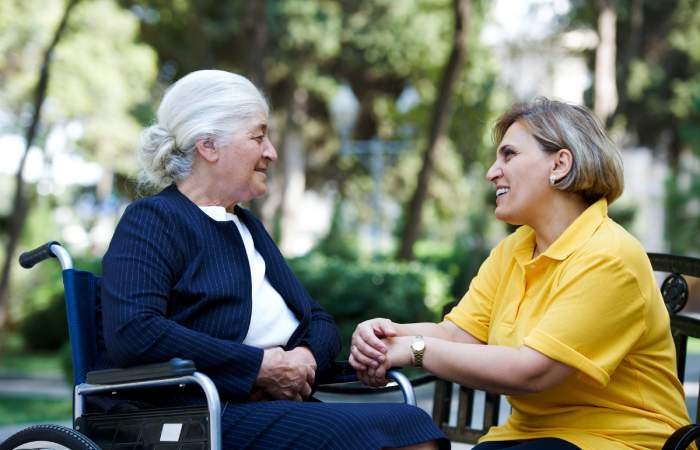In the last decade, the healthcare system has come a long way. Families can now find caregivers and schedule appointments more efficiently than ever before. However, there is still room for improvement. What can be performed to improve the industry? One solution could be ‘upskilling,’ providing more outstanding training to caregivers so they can do their jobs better. Depending on their patient’s needs, caregivers may assume the roles of nurse, caretaker, or companion. Each role has a unique set of responsibilities and skill sets. The good news is that these caregivers can continue improving their skill set through training programs. If you’re interested in some upskilling programs for caregivers, you should consider engaging in online PCA training to hone your skills further.
A positive patient-caregiver relationship is essential for providing high-quality care. Caregivers are frequently the first to interact with patients upon their arrival at a hospital or nursing home, and they serve a vital role in ensuring that these folks receive adequate medical attention and emotional support. However, caregivers face numerous obstacles nowadays. As the population ages and requirements grow, there is a greater demand for caregivers who have received adequate training to best assist their patients with health conditions. This article will explain how upskilling benefits the patient-caregiver relationship. To gain a better understanding, read the points below.
Table of Contents
It Provides Information To The Caregiver
The first way that upskilling can improve the patient-caregiver relationship is by providing more information to the caregiver. When a caregiver acquires new skills, they obtain additional knowledge that may enhance their professional interaction with patients. The information provided could include advice on how to maintain health during treatment or an explanation of the significance of a patient’s specific symptoms. The patient will be able to rely on the caregiver as a reliable source of vital information. In exchange, the relationship between the two will be established on trust through sharing professional information gained through enhancing a caregiver’s skills.
Caregivers Become Proactive
In addition to providing more information, upskilling not only offers additional knowledge, but also empowers caregivers to be more proactive. Instead of merely replying to queries regarding their care or treatment for patients, caregivers can utilize this more excellent knowledge and confidence to anticipate questions and help patients through some of those procedures themselves.
Helps Prevent Caregiver Burnout
Upskilling also aids in the prevention of caregiver burnout by providing a fresh perspective on what it takes to execute their jobs properly. This makes it easy for them to perform and enjoy their responsibilities. As a result, an upskilled caregiver may provide the best services to their patients by avoiding burnout, which can harm the caregiver-patient relationship.
A Caregiver Could Acquire Empathy Skills
Empathy and kindness are essential qualities in caregiver-patient relationships. It is the ability to understand the feelings of others. It is a vital part of patient-caregiver relationships and can be acquired by a caregiver through skills enhancement. Empathy allows you to understand the patient’s perspective, which allows for more effective communication about what they need from you as a caregiver. This makes it easier for you to provide better care by listening carefully when patients talk about their concerns or fears.
By being compassionate, patients will feel more comfortable opening up about their problems with you because they trust that you’ll be understanding rather than judgmental. In turn, this leads them to trust that they can rely on your support during difficult times like illness or the loss of a family member.
Lowers Stress For Both Parties
Caregivers who pursue training sessions have stronger relationships with their patients, which relieves stress for both parties. When your patients realize that you’re up to date on the latest healthcare developments, they’ll feel more confident in you. This improves the bond between the caregiver and the patient, reducing stress for both of you. It also facilitates more open communication between patients and caregivers during appointments or visits, allowing caregivers to learn more about their patients’ needs.
Helps Patients Understand How Much Attention They Need

By giving patients more choice over what happens during appointments and visits with their providers, upskilling allows them to select how much focus and effort goes into delivering care for them, even outside of those visits. This implies that caregivers can effectively communicate with their patients about their schedules and determine when their patients need them. This enables you to spend more time with a patient than required.
Caregivers Remain Competent And Competitive
Through upskilling, caregivers can remain competitive as they adopt new ways of staying helpful to their patients. The health care sector is a rapidly evolving market, with new technologies, tools, and services being introduced every day. To remain competitive, caregivers need to adapt to these changes by learning new skills through advanced training programs. Although when you’ve been doing the same work for years or even decades, this change might be challenging. However, suppose you want to be continuously relevant and fulfilled in your job. In that case, you should consider learning and adapting throughout this moment of rapid change in order to be ready for what comes next.
Conclusion
If you want to ensure that everyone has access to the highest quality care, you must invest in caregiver upskilling. Come to think of it, how can a caregiver who only knows how to assist with basic hygienic needs take the next step in making patients feel at ease? The answer is straightforward NO. Consequently. Competition and innovation are beneficial for any industry and will be beneficial for the health care industry in the long run. The best way for both employees and patients to benefit is if caregivers have access to exceptional education. Whether through college or professional development courses. When a caregiver participates in upskilling training, they build confidence in their talents and acquire new skills in their chosen sector. Ultimately, the patient will receive improved treatment from their caregivers. All of this can be the outcome of an excellent professional relationship established by the caregiver’s acquired knowledge.






